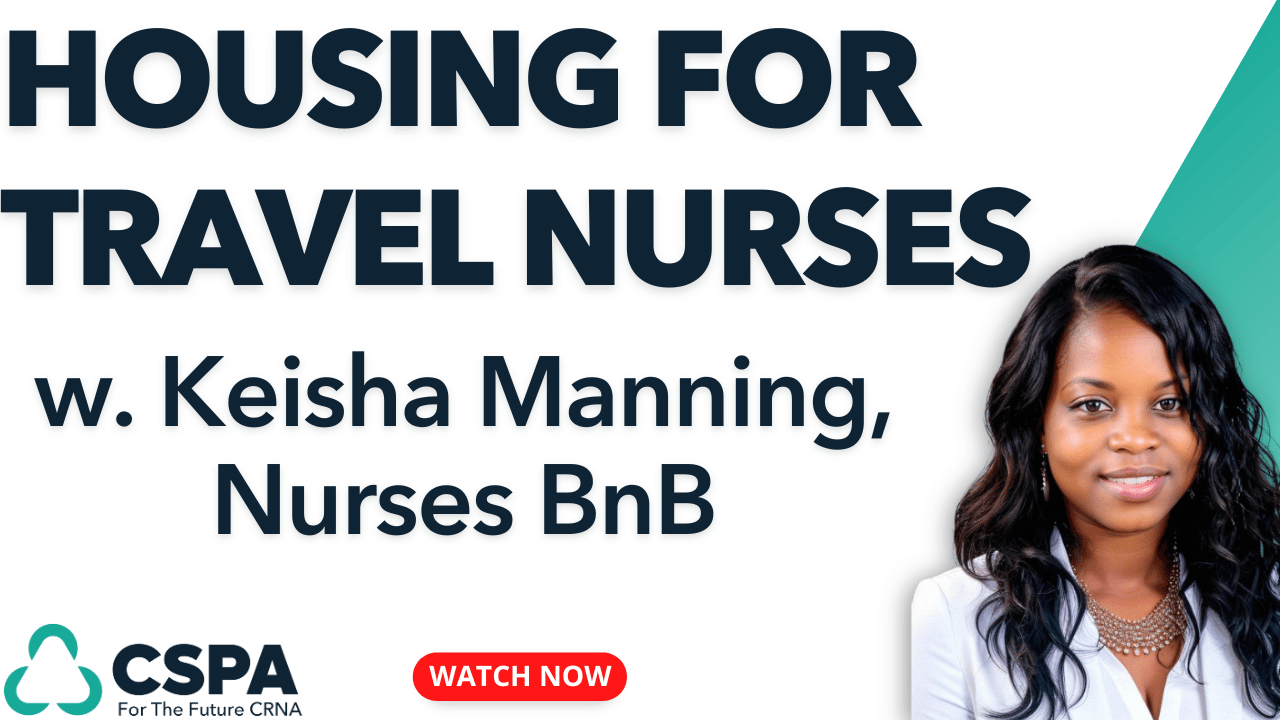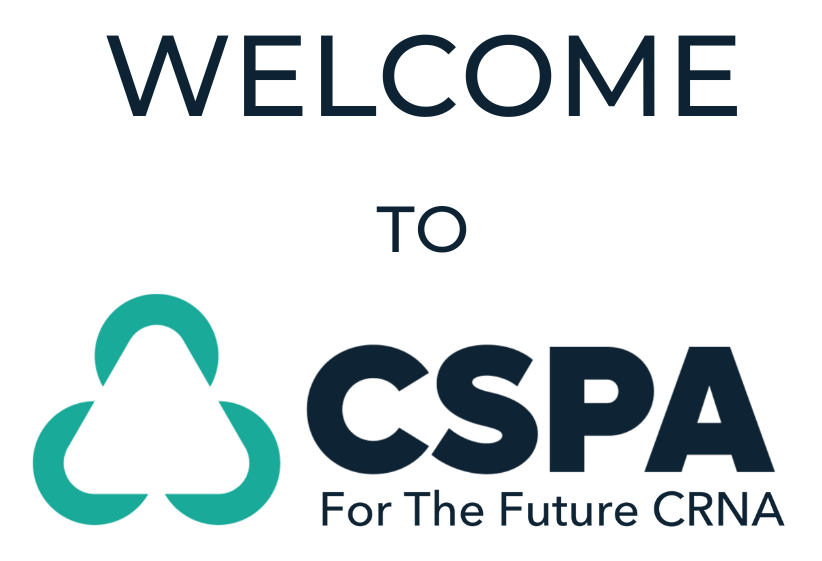
Get Your Free 8 Steps to CRNA Road Map Guide
CRNA school is expensive, and worrying about CRNA salary information is a valid concern. In this episode, Jenny Finnell breaks down everything you want to know and more about finding the right job with the right salary and benefits for you. She discusses the different factors you need to consider when it comes to prospecting, such as who to ask, where to work, how much you need to work, and where to find jobs. Jenny also lists down the important things you need to consider in terms of compensation and benefits. Tune in to learn all about it.
Grab a list of the most affordable CRNA Programs: https://www.cspaedu.com/affordable
Get access to planning tools, valuable CRNA Faculty guidance & mapped out courses that have been proven to accelerate your CRNA success! Become a member of CRNA School Prep Academy here:
https://www.crnaschoolprepacademy.com/join
Book a mock interview, personal statement critique, resume review and more at https://www.TeachRN.com
Join the CSPA email list: https://www.cspaedu.com/podcast-email
Send Jenny an email or make a podcast request!
Hello@CRNASchoolPrepAcademy.com
—
Watch the episode here
Listen to the podcast here
CRNA School Is Expensive! So How Much Money Do CRNAs Make?
How Much And Who To Ask
In this episode, we are going to discuss how much money a CRNA makes. Based on a 2020 report, there are about 2,800 SRNAs, and we have about 50,000 CRNAs in the entire United States. It is not even 10%, but still, it gives you a good idea of a ballpark figure. The median CRNA salary is around $200,000. This is unchanged from the 2019 survey, which is shocking. I would put my money on the fact that I bet you the 2021 report when it comes out that we will see a substantial increase. The median CRNA salary is $200,000. That is approximately $100 an hour if you break it down to an hourly rate.
This is going to vary from facility to facility. States that have a much higher cost of living are going to be paid much higher per hour. States that have a lower cost of living are going to be paid much less. There are occasional, unique places. You can even live in a place where you have an affordable cost of living, and you can still make a decent amount of money. You just have to seek those facilities and positions out. The best way to do that, if you are looking for jobs now as a CRNA, is to network within the community. That is by far the best way to find positions. It is funny because I have had locum companies come up to me and want to work with me and help them recruit.
They asked me, “In your opinion, as a CRNA, how do you find jobs?” I was honest and said, “I just talk to people. I do not go to companies. I have used things like Gasworks and things like that to look, but you can find so little about a position online that it is just a waste of time if you ask me. It is more about calling up a CRNA and another CRNA and talking. That is how, in my opinion, you find the best jobs.” Not to mention, you want to talk to multiple CRNAs prior to considering a job. You want to ask hard questions such as,” What is the most senior CRNA you have on staff?”
Find out what their turn rate is, “How often are people leaving? How satisfied are you with the environment? What is it like working there? Are you treated well? Are you respected? Does the OR staff treat you well? Do the attendees treat you well? What is your scope of practice?” If you want to do something like hearts, for example, “Do you have any opportunities to do that, or is it impossible?” Talking to people to try to gauge what it is like working there is always the best way to find a job. I told you that $200,000 is the median salary for CRNAs, but there is also a wide range.
How Staff Shortage Will Impact Pay
The lowest I have ever heard of is right around $150,000. That is usually for a new grad. This is from The Heart of It All in Ohio. Ohio is a relatively cheap place to live, which I am very thankful for. We are supposedly boring too, but I enjoy boring. I like not having hurricanes and earthquakes. I am cool right here. Give me some corn on the cob, and I am all set. That being said, it is going to vary. That position I know was paying that low is now paying much higher. They had given a substantial raise up to $170. It has changed quite a bit. That is why I said I bet you that the report that comes out here next for 2021 is going to be substantially higher.
Every place is short-staffed. Places are losing people. People are retiring and leaving. We have known this for a long time. I know nurses are like this too. A good chunk of our working population is on the verge of retiring. We are going to have shortages. The last number of years has not helped anything. People who were going to wait five years to retire were like, “Peace out. I am done. I do not want to deal with this.” I do not blame them. If you could retire and you are only a few years away, why do not you just do it now? The burnout people are experiencing is like, “I will retire now instead.” That is happening with CRNAs as well.
A good chunk of our population is retiring, so it's a really good time to become a CRNA. Share on XWe are not immune to that. A good chunk of our population is retiring, so it is a good time to become a CRNA. It is funny because I get asked this question a lot as far as, “Is it oversaturated?” I do not know where this information is coming from. I would check the credit on that because I do not think they have any street cred.
I do not know who would say that CRNA is a saturated market because it is completely not. It makes me laugh because it has never been. I have been a CRNA for many years, and it has never been saturated. I have never had issues finding a job. The last time I job hunted, guess when I did it? In April of 2020. Do you know what happened in April of 2020 in the OR world? We shut down. They were not even operating.
I was like, “I am going to go find a job.” That is what I did. I had four job offers during the pandemic when the operating room was shut down. That being said, kudos to being a CRNA. You have good job security. You will never have to worry about finding a job as a CRNA. You have negotiating power because people will want you. You are a very highly skilled provider.
I have also experienced W-2 positions and PRN positions, which are still W-2, but you do not get the benefits like the retirement and the medical benefits. I am also getting ready to go into the 1099 world. It fell on my lap. I was not even looking for it because when you have good connections within the community, you tend to have more opportunities.
How Much You Can Earn Working Flexible Hours
Get involved in your state association, your national association. Not only is it vital for your profession, and you should be doing it. It is a great way to open the doors for more possibilities career-wise. I was not looking for this. It is a unicorn job. It is a locum position that is going to allow me to be a PRN. It is very unusual to find a CRNA locum position that is going to let you and treat you like an actual PRN employee.
I can set my hours. I can work nothing for an entire month, or I can work 4, 5, or 2 shifts in a month. I can set my own schedule and not be held for a certain amount of hours, and I am paid a locum rate. To put a ballpark idea in your mind about what a searing locum rate is, we are looking at around $180 or $200 an hour. $180 an hour is approximately $345,000 a year. $200 an hour would be $400,000 a year if you were to work full-time at that pay rate. I am not planning on working full-time, but you could. They would have the availability if I wanted it. I just do not.

CRNA School: You will never have to worry about finding a job as a CRNA. In fact, you have negotiating power because people will want you. You are very highly skilled provider.
I am at a point in my life where my time is worth its weight in gold. Good luck trying to get me to work a bunch of hours when I care the most about my time. That is a phase of my life. We have three little kids, and I run CRNA School Prep Academy. I love being a CRNA. You guys know that I am passionate about it. I would never be able to give up my bedside because I love being a CRNA. I love doing it. I consider it my fun day. My OR time is my easy time. I also love my business too. I love my students, and I love mentoring.
I have to find a fine balance. Being PRN is the best of both worlds, where I can still get to go practice my skills, provide anesthesia, which I love to do, and mentor future generations of CRNAs. If I did not have CRNA School Prep Academy, I would be full-time. I would work 36 hours to 32 hours a week, or now that I have my student loans paid, I would even consider dropping the part-time and then picking up a locum position.
Where I work, I can be part-time at sixteen hours a week. How sweet is that? Sixteen hours a week, and I could get benefits. On the horizon, if I ever could or if I ever can, I would consider working part-time there at sixteen hours a week and then picking up a locum shift once a week. The pay rate is so much higher, and it gives me a variety of my experience.
I work at a pediatric hospital. We also do burns. This locum position is an adult hospital, but they do all their own regional, which is exciting. I did get trained very well on how to do regional blocks. I do not get to do them where I work. I am going to get experience doing that again. They also have a heart team, which I was not anticipating doing hearts. I still do not know if I am going to, but when they saw my resume, they were like, “We will use you.” I am like, “Just 1 or 2 days a week, use me for your heart or your lung cases.” I do have a background in the open heart. They were excited to see that on my resume. To be continued to see how that unfolds.
How Networking Raises Job Opportunity
I was not anticipating going in as a locum to do any hearts, but I love doing hearts. We will see. It is very unique, and I would never have found this position if it was not for the network that I am in. It means that I am very active in the state association, go to meetings, and present this opportunity from a CRNA. It’s always the best way to find a job. If you are ever wondering if you are in school, “How am I supposed to find a position after school?” you have to network. You have to talk to CRNAs. Someone will know someone. This community is small. I promise you. There is a CRNA that you go to clinical with at some facility that will know someone at a facility in a different state far away.
I know CRNAs in Hawaii, Alaska, California, and New York. You name it. I know a CRNA pretty much in almost every state of the country. Just me and my lonely little self here, but I guarantee if you were to ask all my coworkers, they would have an even bigger network. Networking is crucial in this community because we are small and look after our own. CRNAs are very good at that. We do watch out for one another and help each other find good jobs. Let’s talk about other things as far as to pay. As a new grad, you can anticipate making $85 an hour, maybe even higher than that.
Networking is really crucial in this community because we are small and we do look after our own. Share on XIn the state where I live, I know CRNA who, when he graduated, was making $100 an hour as a new grad. That is extremely high for our area, but that just goes to show it does exist. The average to anticipate is right around $86 to $90 an hour. It does not mean that $100 an hour jobs are not out there. They are, but you have to look for them. This position was at an all CRNA practice. It was the rule. That also changes things. If you take a job in the inner city, you are not going to have the most competitive pay because they have more applicants coming in for the position. If you are okay with living in a rural area and working at a hospital that has less applicants and less to pick from, they are more likely to have to pay higher to get staff.
Why You Need To Love Your Job First
That is something to consider, and then also the type of practice. Money is great and all, but if you hate your job or you do not like where you work, I promise you, you will not care how much money you make. I am raising my hand on that one. You are not going to like every place you work. I experienced this when I was unhappy, and I was shocked that I was unhappy. I did not anticipate this happening. I was not happy. Maybe this was not for me. It does not mean that it was a bad place and no one should work there. It just was not for me. It was not my cup of tea. There are a lot of things I had issues with.
Off I go. No harm, no foul. I like building long-term relationships. If you hire me, I want to be there for a while. I do not want to jump around because that is stressful, and that is not a resume I want to carry where I look like I am hopping jobs all the time. I do try to pick jobs with the intention of staying. Sometimes, you pick, and you pick wrong. You are not going to be happy. It does not matter how much money you make. If you do not like the work environment, you are not going to be happy. Even if you like providing anesthesia, if the work environment is not good, it is not good. Good environments do exist.
I love where I work. It is a great environment. There are negatives. What I am looking for is friendliness, ease of working, team, communication, flexibility, and getting out on time. I have it all. Friendliness of not just the CRNAs, but the staff, in general, I have that. I am happy. That being said, I do not do original blocks. I sacrifice that. The autonomy is not as much as I used to have. I sacrifice that, but everything else is great. I get a good experience and a good variety of cases. What I am trying to explain is there are going to be positives and negatives to every position.
Five Factors You Need To Consider
You have to decide what is important to you. It comes down to five factors. It will be pay, location, meaning how far is your commute. I know coworkers who drive an hour to work where I work because they do not have the options where they are, or the options they do have are not what they want. The location could be a deciding factor as far as where you take a job.
Next is the scope of practice, meaning the type of practice. Do you do hearts? Do you want to do OB? Do you want to do peds? Do you want to do regional blocks? Do you want to do an all CRNA practice? Do you want a supervision model? Do you want an ACT model? As can see, the scope and type of practice can change as far as what type of job you take.

CRNA School: Get involved in your state association, your national association. Not only is it vital for your profession and you should be doing it but it’s a really great way to open the doors for more possibilities career-wise.
The next thing you got to consider are benefits and a retirement package. Those can differ quite a bit. Some places are great at retirement. They may not pay you as much, but then you have to ask yourself, “What does this break down to if you consider how much they are giving me in my retirement? I am only paying $200 for my medical or $300 for medical for my family.” That is huge because I pay out of pocket for private medical, and it is so expensive. It is not great insurance. The benefits are huge, so consider that. Lastly, you should consider vacation and time off because that can vary too. You also need to talk to people to see how happy they are.
I talked about the environment as far as, “Did they do team building activities? How well did they communicate there? How well are you being treated? How friendly is the staff?” You get that insider information from talking to current CRNAs working there. I highly recommend that you always do that. Not just one CRNA, but multiple CRNAs who work at a facility. Talk to more than one and then compare. Make sure they both are aligned with, “This is great. This is like rainbows and sunshine.” You might have someone who says that and another person who says, “It’s this and this.”
“Why is it so different?” You have to ask. What I did was I talked to one person. I found out at the position also that I was not happy, they were using their staff to recruit, and they were giving bonuses like $1,000 for you to recruit. I am not saying that that is wrong. I know a lot of places do that. I was asked to work there by a friend.
You want your friend to work with you because how fun is that to go to work and see your friend every day? That, I enjoy. I love seeing my girlfriend. That was amazing, but the fact that they had to give these giant bonuses to have CRNA recruit was like, “Was there anything said that could have been said about what was going on?” Try to find that out, too, like, “I’m curious. Do you guys do recruiting bonuses?” It could be an indication that it is a place that has a harder time keeping staff.
It is something to think about. It does not mean it is always true, but I want to at least put it in your brain to think about and consider. Let’s talk about PTO. PTO can vary. I have seen ranges from 4 weeks as a new grad to 6 weeks as a new grad. The longer you work there, the more PTO you get. I had been a CRNA for years, and I would have six weeks of vacation. By ten years, I would have an additional week, so seven weeks. Some places will give you 12 sick days, 7 holidays, and 5 weeks of vacation. If you look at how that all breaks down, that is nine weeks of vacation, but you are not going to be using twelve sick days. What is nice about sick days is some places will allow you to have this giant bank of sick days.
Some places will expire sick days. Some places will let you roll over certain vacation hours. Some do not. What is nice when they do allow you to roll over is if you plan on having a baby or surgery, you can save some time off. You can have more to pay time off if you need it if you know you are going to expect it. I did that when we had our first two babies. I would save two weeks of vacation and roll it over.
If you don't like the work environment, you're not going to be happy. Even if you like providing anesthesia, if the work environment is just not good, then it's not good. Share on XI had eight weeks of vacation to take all my maternity leave, plus a short-term disability. That is unfortunate that even as a CRNA, even in medicine, most places do not have a great maternity leave. There are a few hospitals that have fully paid maternity leave, as well as paternal paid maternity leave, that does exist.
The place I am referring to does not pay as high as salary goes, but that is a good perk. Go there, have your babies, and then leave for a higher salary. I’m kidding. It is something to at least consider if you are planning on having 5 or 6 children. Go to a place that has good maternity leave. It is so expensive to have babies and lose out on your CRNA salary or have to burn all your vacation. When you come back to work, you are like, “I cannot miss a single day. I am going to drive myself insane.” Think about it. If you had a baby in January and came back in March, you would have to go the rest of the year without missing a single day of work.
Gosh forbid if your baby is sick, then what? You take an unpaid day. It is something to think about. Most people I knew would roll over some vacation or even borrow vacation from the next year if things like that happen. It gets incredibly hard, especially as a parent. It is hard to work and be held to these rules when you are a working parent. Also, something to think about too is CME money and QPI. CME, you are probably familiar with it. It is mandatory education. You have to get CME credits to maintain your CRNA license. You can expect anywhere from $1,500 to $2,000 a year as the average. I am sure there are places that give more than that. What I have seen the average to be is right around $2,000.
QPI is an incentive bonus. You charted 50, but you did not waste the other 50, and you forgot to waste it in a system, or you charted 100, but you only gave 75. You wasted 25, and they are like, “What is going on? You said you would give 100, and you waste 25.” Mistakes happen. That went into your QPI. Another thing is joining committees and coming into a committee, attending a certain amount of staff meetings, and not having missed too many days of work. It means not calling it off. That is QPI as far as your QPI bonus. In my experience, that has been right around $2,500 to $3,000 a year. They lump sum and give that to you next fiscal year.
You would get distributed last year’s QPI in March of the next year. It is a lump-sum payment, and then take out all the taxes and then get what is left. That is something to keep in mind too. I am assuming if you are reading this, money is on your mind. Why not pick an affordable CRNA school? I am not going to go into this topic too much, but I have students ask me like, “If I go to this school, it is Ivy League and pay $200,000 for this education. Will I get higher and better paid CRNA jobs?” No, it does not matter how much you pay for your education. As long as you work hard in your clinical and pass your boards, you are going to be on the same playing field as all the rest of the CRNAs who are new grads.
Paying $180,000 or $50,000 for your education does not make you any less of a CRNA when you graduate. What can make or break you is your clinical, how well you perform, and your attitude. Attitude is anything. It is not your skillset. Your attitude and how you show up at clinical land you good jobs after school and networking. Keep in mind also that in a lot of the most affordable schools, you have to be in-state to get that tuition. Plan ahead and try to get a residency. Most states require 1 or 2 years for you to live and work in that city or state prior to getting in-state tuition at that college.

CRNA School: If you take a job in inner city, you’re probably not going to have the most competitive pay because they have more applicants come in f or the position.
If you have enough time and can plan to work your ICU time and the state you want to go to school that you know has affordable schools to pick from, knock yourself out. Do it if you have the ability to do so. Back to CRNA salary, I hit most of the highlights with this episode. In places that have a high cost of living, like New York or California, you are going to make more than $200,000 a year. I would sure hope so anyway because a 700-square-foot apartment in New York is an obscene amount of money.
I sure hope those CRNAs make a lot more than $200,000 a year. Know that this is going to vary based on where you live. This is the mean, the average, and it is only based on 2,800 people who took the survey. There are 50,000 practicing CRNAs in the United States. Does it encompass everything? No, but it is a good ballpark to give you an idea.
I do not think I have gotten there yet, but locum positions are anywhere from $180 to $200 an hour. It is what you can expect. You can find a locum position that is more like a PRN. They are not common, but they exist because I was able to find one, and I was not even looking when I found one. They are out there. The reason why I have always not done the locum thing prior is because most locum positions will make me drive too far away and have to stay away from my family. That is a no-go for me. I got to be home, snuggle my kids, kiss them, and tuck them in good night. That is a big thing for me.
This position I found is only an hour away, so I can drive an hour. No big deal. I listen to my podcast. I do not mind an hour’s drive, but any more than that, I would have to question whether it would be worth it for me. I do not want a two-hour drive. I want to come home at the end of the night. I would never take a locum position where I would have to be away from my family. That is not for me, but it works for some people. If I had to, if it came to where I was going to lose our house, I would do it. If I could make more money and we had to, financially, I would do it. If I do not have to, I will not.
That is where my mind is at with that. Locum positions, historically, would make you work a certain schedule, meaning Monday through Friday, eight hours. Monday through Thursday, ten hours. They would designate that they want you every week for a certain amount of time. I do not like that because I am all about flexibility. That is why I love my PRNs. I hope you guys enjoyed this episode. Thank you so very much for reading, and I will see you next episode.
Important Links
Get access to planning tools, valuable CRNA Faculty guidance & mapped out courses that have been proven to accelerate your CRNA success! Become a member of CRNA School Prep Academy here:
https://www.crnaschoolprepacademy.com/join
Book a mock interview, personal statement critique, resume review and more at https://www.TeachRN.com
Join the CSPA email list: https://www.cspaedu.com/podcast-email
Send Jenny an email or make a podcast request!









